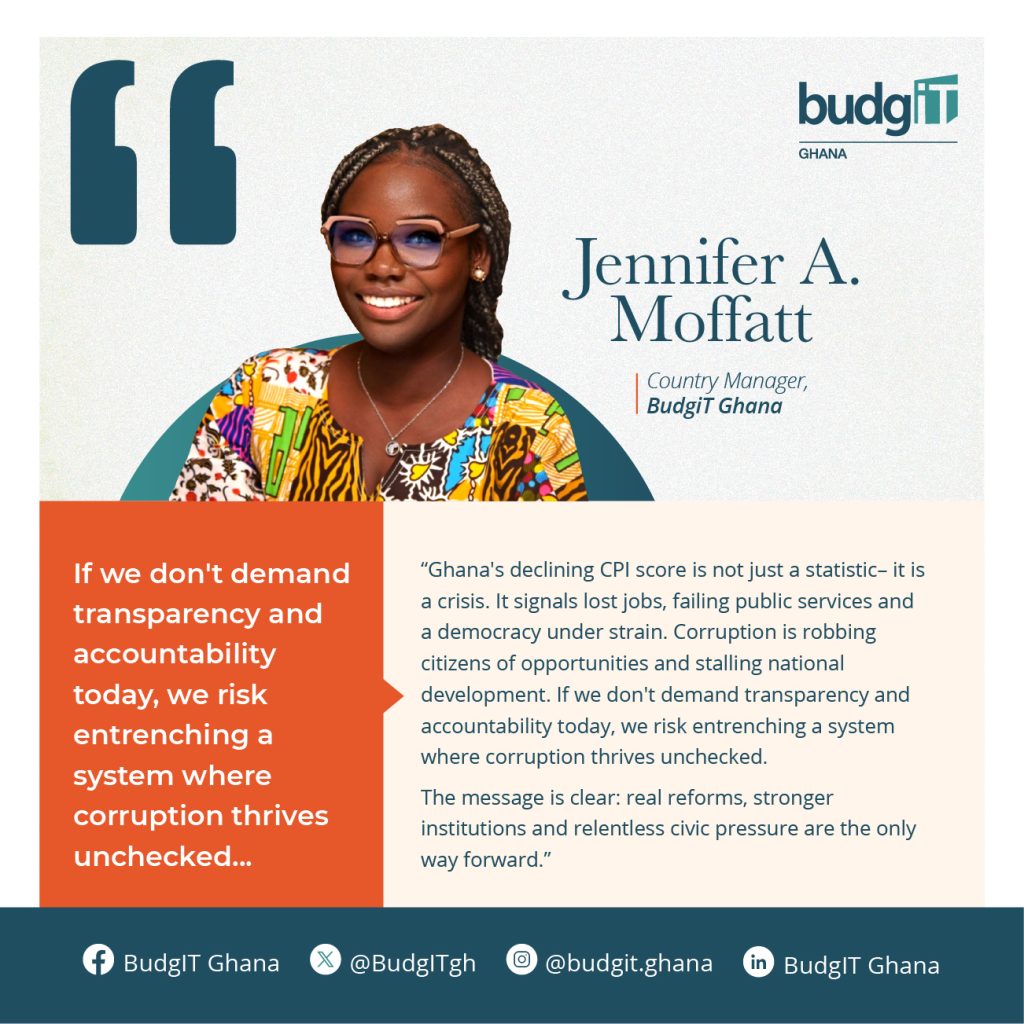The 2024 Corruption Perceptions Index
Accra, Tuesday, February 11, 2025 – BudgIT Ghana expresses deep concern regarding Ghana’s troubling performance on the 2024 Corruption Perceptions Index (CPI) released by Transparency International. With a score of just 42 out of 100, this marks Ghana’s first decline in five years and highlights a critical deterioration in the country’s fight against corruption. This situation demands urgent, decisive action to restore accountability, integrity, and public trust in governance.
For the past five years, Ghana’s CPI scores have fluctuated between 42 and 45, indicating a persistent struggle with corruption and a temporary stabilisation in efforts to combat it. The recent drop exposes the failure of these efforts and signifies a worrisome trend that reflects a governance climate where anti-corruption measures are ineffective. The score underscores the escalating public dissatisfaction with corruption, significant gaps in institutional effectiveness, and serious concerns regarding transparency in public financial management.
Understanding Ghana’s Anti-Corruption Landscape
The decline in Ghana’s CPI score must be examined against the backdrop of a deteriorating governance environment. Despite various anti-corruption institutions such as the Office of the Special Prosecutor (OSP), the Commission on Human Rights and Administrative Justice (CHRAJ), and the Economic and Organized Crime Office (EOCO), these entities face significant obstacles. Challenges include inadequate funding, political interference, and a compromised enforcement framework.
Key factors driving this decline include:
- Inadequate Funding of Anti-Corruption Institutions: Institutions like the Office of the Special Prosecutor (OSP) in the 2024 National Budget were only allocated GH¢149,005,669 which represents 0.06% of the total budget. This raises concerns about the administrative effectiveness of the OSP in the prosecution of corruption and corruption-related cases in a country where corruption is very high.
- Unresolved High-Profile Corruption Cases: Numerous scandals have gone uninvestigated or unresolved, including the former Minister for Sanitation and Water Resources, Madam Cecelia Dapaah’s case, diminishing public trust in accountability mechanisms and suggesting a lack of political will to address such issues.
- Lack of Transparency in Public Procurement and Spending: Government contracts are often awarded without adherence to established procurement laws. For instance, most government contracts happen outside the GHANEPS, leading to concerns about the misappropriation of state resources and fostering a culture of corruption.
- Weak Enforcement of Anti-Corruption Laws: Despite investigative reports highlighting corruption, prosecutions are infrequent and often influenced by political considerations, indicating a lack of commitment to uphold the law impartially.
- Perceived Political Manipulation of Anti-Corruption Institutions: The independence of anti-corruption bodies is compromised by political interference, affecting their ability to operate effectively and undermining public confidence in these institutions.
Significance of This Score for Ghana
Ghana’s low CPI score has serious implications for governance, economic stability, and foreign investment. A negative perception of corruption erodes public trust, discourages foreign direct investment (FDI), and threatens the country’s ability to secure essential development funding. It also compromises service delivery in crucial sectors such as health, education, and infrastructure, where corruption diverts resources from those who need them most.
If urgent reforms are not implemented, Ghana risks falling even further in future CPI rankings, tarnishing its reputation on the international stage and weakening its position in regional and global institutions that prioritise democracy, human rights, and good governance.
Call to Action: Strengthening Ghana’s Anti-Corruption Agenda
BudgIT Ghana calls upon the government, civil society, the media, and all stakeholders to treat this latest ranking as a critical alarm bell. We advocate for the following immediate actions by the government:
- Empower Anti-Corruption Institutions: Ensure the OSP, CHRAJ, and EOCO are adequately funded, independent, and shielded from political pressure.
- Ensure Transparency and Accountability: Mandate strict compliance with open budgeting principles, transparent procurement practices, and full public disclosure of financial activities.
- Relentlessly Enforce Anti-Corruption Laws: Investigate and prosecute all corruption cases thoroughly, irrespective of political connections.
- Protect Whistleblowers and Encourage Civic Engagement: Establish robust protections for those who expose corruption to ensure that citizens and media can operate without fear of intimidation or retaliation.
- Implement Technology-Driven Governance: Utilize technology to enhance the tracking of government spending and procurement processes, thus reducing gaps that foster corruption.
Civil Society Organisations and the media should intensify their public engagement and educational campaigns on government spending and international actors including donors should support Ghana’s Anti-corruption efforts.
Ghana’s decline in the CPI 2024 rankings is a wake-up call—it is not just a number, but a grim reality for countless Ghanaians suffering the effects of corruption each day. BudgIT Ghana is unwavering in its commitment to advocating for transparency, accountability, and responsible governance. Immediate action is crucial to reverse this trend and build a future where integrity is at the forefront of public service.
Jennifer A. Moffatt
Country Manager
BudgIT Ghana
